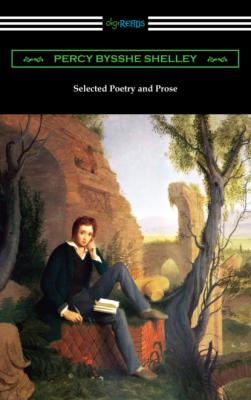Selected Poetry and Prose. Percy Bysshe Shelley
Чтение книги онлайн.
Читать онлайн книгу Selected Poetry and Prose - Percy Bysshe Shelley страница 53
 I remember one remark which then
I remember one remark which then
Maddalo made. He said: ‘Most wretched men
Are cradled into poetry by wrong;
They learn in suffering what they teach in song.’
If I had been an unconnected man,
I, from this moment, should have formed some plan
Never to leave sweet Venice,—for to me
It was delight to ride by the lone sea;
And then the town is silent—one may write
Or read in gondolas by day or night,
Having the little brazen lamp alight,
Unseen, uninterrupted; books are there,
Pictures, and casts from all those statues fair
Which were twin-born with poetry, and all
We seek in towns, with little to recall
Regrets for the green country. I might sit
In Maddalo’s great palace, and his wit
And subtle talk would cheer the winter night
And make me know myself, and the firelight
Would flash upon our faces, till the day
Might dawn and make me wonder at my stay.
But I had friends in London too. The chief
Attraction here was that I sought relief
From the deep tenderness that maniac wrought
Within me—’twas perhaps an idle thought,
But I imagined that if day by day
I watched him, and but seldom went away,
And studied all the beatings of his heart
With zeal, as men study some stubborn art
For their own good, and could by patience find
An entrance to the caverns of his mind,
I might reclaim him from this dark estate.
In friendships I had been most fortunate,
Yet never saw I one whom I would call
More willingly my friend; and this was all
Accomplished not; such dreams of baseless good
Oft come and go in crowds and solitude
And leave no trace—but what I now designed
Made, for long years, impression on my mind.
The following morning, urged by my affairs,
I left bright Venice.
After many years,
And many changes, I returned; the name
Of Venice, and its aspect, was the same;
But Maddalo was travelling far away
Among the mountains of Armenia.
His dog was dead. His child had now become
A woman; such as it has been my doom
To meet with few, a wonder of this earth,
Where there is little of transcendent worth,
Like one of Shakespeare’s women. Kindly she,
And with a manner beyond courtesy,
Received her father’s friend; and, when I asked
Of the lorn maniac, she her memory tasked,
And told, as she had heard, the mournful tale:
‘That the poor sufferer’s health began to fail
Two years from my departure, but that then
The lady, who had left him, came again.
Her mien had been imperious, but she now
Looked meek—perhaps remorse had brought her low.
Her coming made him better, and they stayed
Together at my father’s—for I played
As I remember with the lady’s shawl—
I might be six years old—but after all
She left him’…’Why, her heart must have been tough.
How did it end?’ ‘And was not this enough?
They met—they parted.’—‘Child, is there no more?’
‘Something within that interval which bore
The stamp of why they parted, how they met;
Yet if thine aged eyes disdain to wet
Those wrinkled cheeks with youth’s remembered tears,
Ask me no more, but let the silent years
Be closed and ceared over their memory,
As yon mute marble where their corpses lie.’
I urged and questioned still; she told me how
All happened—but the cold world shall not know.
LETTER TO MARIA GISBORNE
LEGHORN, July 1, 1820.
The spider spreads her webs, whether she be
In poet’s tower, cellar, or barn, or tree;
The silk-worm in the dark green mulberry leaves
His winding sheet and cradle ever weaves;
So I, a thing whom moralists call worm,
Sit spinning still round this decaying form,
From the fine threads of rare and subtle thought—
No net of words in garish colours wrought
To catch the idle buzzers of